Text
We can't be writing high tension, high action, high drama scenes all the time.
Writing is all about contrast.
To set up that magnum opus scene, we need a preceding, contrasting, low tension, low action, low drama scene.
The Trick To Writing Filler
(TL;DR at the bottom)
Filler is when you spend a chapter padding the length of your story between plot-related events. Filler chapters have little to no impact on the overarching plot and can be self-contained, and thus in TV shows filler episodes are often reran the most as people unfamiliar with the show can casually watch without being confused without the knowledge of prior plot beats
So with the chapter being largely self-contained and acting outside of the plot, what do you use to make the filler chapter engaging? I’m going to use filler episodes from Avatar: The Last Airbender to provide examples
1. Worldbuilding. Zuko Alone depicts Zuko’s travels taking him through an Earth Kingdom village and becoming acquainted to the family that allows him to stay with them, especially their young son. He learns about what the Fire Nation’s impact on this village has been; destroyed houses, families torn apart, constant robbery and other abuses of power and injustices. And even after Zuko defends the villagers and his new friend, he’s venomously cast out from the village by even the little boy because he outed himself as a firebender. This episode explored the impact of the war on the people of the Earth Kingdom, the victims of war that have no involvement in it and no way of defending themselves from it
2. Character exploration. In The Beach, we learn more about Mai, Ty Lee, Azula and Zuko and how their own traumas and personal upbringings have impacted their personalities. For Zuko this is part of a turning point for him, but for the girls it’s more to understand why they are the people we’ve gotten to know over the seasons, especially Ty Lee and Mai. The episode also serves to showcase how Azula and Zuko are so out of place being just normal teenagers; Azula has no idea how to talk to her peers and no identity outside being Princess Azula of the Fire Nation, while Zuko’s hotheadedness and jealousy issues lead him to lash out and be far too confrontational and controlling for his own good. This episode isn’t really used to develop these characters, or at least not the girls, but instead explains and showcases their behaviours and the reasons behind them
3. Character development. Going back to The Beach, Zuko does indeed receive development rather than just character exploration like the girls do; he comes to understand that he’s not just angry at the world or angry in general, but angry with himself. This is a notable turning point for Zuko’s redemption arc, because he now understands fully that he truly regrets betraying Iroh and sacrificing his new start in life in favour of returning to the Fire Nation. He might not yet be fully decided on turning his back on Ozai, but without this moment I don’t know if he’d have gotten there, or at least not as quickly as he did
4. Relationship development. Sokka’s Master has a C plot of Aang, Katara and Toph all being rather bored and lost without Sokka’s presence. The A plot exploring Sokka’s feelings of inadequacy and uselessness in comparison to such powerful and formidable bending masters being contrasted with the Gaang unable to function without him already speaks volumes about their dynamics, but looking deeper into the C plot also shows how much value Sokka really does bring to the team; structure, planning, humour, a quick wit, strategic moves. The Gaang always supported Sokka and never seemed to view him as expendable outside of the occasional teasing, but having it acknowledged so clearly and plainly that they can feel a little aimless and flat without Sokka and being so delighted when he returns really shows us the kind of value Sokka brings to this team and brings us and the characters to further appreciate it
5. Downtime. The Ember Island Players depicts the characters taking a break to watch a comedic play based on their wacky adventures, only to be largely underwhelmed and displeased by how they’re portrayed. There are no stakes to this episode and barely any plot, just the Gaang taking a breather as they react to a bad play. This chance to relax and watch something inconsequential is just as important to the viewers as we’ve got the show’s finale in the next four episodes, which will be very plot-driven and intense. The Ember Island Players also has the additional viewer bonus of recapping the events of the show right before it all ends, giving the viewers time to reflect on the journey they’ve gone on with these characters. In order for the stakes to feel high and the tension to rise, there has to be downtime where there are low stakes and low tension; if things are intense all the time, the moments that are supposed to feel super intense will just feel average in comparison. Resetting that intensity right before such a big event while still acknowledging the looming threat coming soon will feel like the calm before the storm and allow your audience to soak it all up like the characters are
Wow, did I just go through all that without talking about Tales of Ba Sing Se? I’ll save that for another post if people are interested in more
TL;DR - filler provides a moment to breathe, reset the intensity levels the audience are experiencing and take a chance to step away from the external conflict (the overarching plot) in favour of worldbuilding and the characters within your setting. Small moments can amount to something big, and can help make large scale decisions or plot twists feel more build-up and in-character
382 notes
·
View notes
Text
Tiny Review: The Goldfinger 2023. Anti-capitalist, heist-like movie.
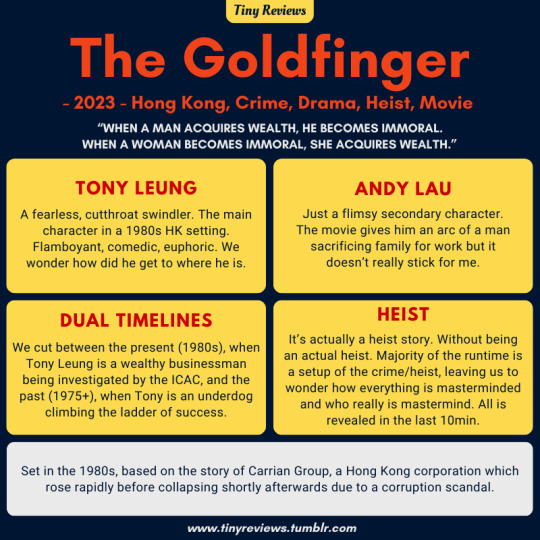
Watch it for Tony Leung and Andy Lau. There is a lot of flash and flair but not much substance or story I feel.
To realise this has the same writer and actors as Infernal Affairs(and hyped as similar production) disappoints me further.

The Goldfinger is a 2023 Hong Kong crime drama film written and directed by Felix Chong, and starring Tony Leung and Andy Lau.
#the goldfinger#goldfinger 2023#felix chong#tony leung#andy lau#infernal affairs#hong kong movies#crime movie#drama movies#heist movie#2023 movies#m#movie review
2 notes
·
View notes
Text
Writing Tips: Flaunt your prose, or keep it simple?

When it comes to writing, some people espouse evocative expressions. Some advocate briefness.
Like many things in life, I think there is no true this-or-that answer. The trick lies in knowing when to use clever wordplay and when to keep things short.
Here's a guide to make these decisions:
Action Scenes: During moments of high tension and fast pacing, keep things brief. Short, impactful sentences enhance the sense of urgency. Focus on key details. Drive the action forward without getting bogged down in excessive description.
Emotional Scenes: When exploring emotional depth or delving into character, use elaborate prose. Describe their thoughts, feelings, and inner conflicts. Invite empathy by creating a rich, immersive experience.
Setting and Atmosphere: Elaborate prose is effective when setting scenes and creating atmosphere. Use vivid imagery, sensory details, and evocative language. Transport readers into the world of your story.
Plot Points and Revelations: Strike a balance between brevity and elaboration. Provide enough detail to ensure clarity and impact. Build suspense with wordplay. Avoid over-explanation or dragging out the reveal. Allow the reader to do a doubletake.
Dialogue: This is where most teachers preach brevity. Keep exchanges concise and focused. Advance the conversation. Reveal character dynamics. However, don't shy away from using elaborate prose in moments of high emotion.
The key is to be mindful of the pacing, tone, and emotional resonance of each scene. Sometimes, clever wordplay engages the reader. Sometimes, it’s more impactful to keep things short.
Happy writing!
This is part of my Writing Tips series. I publish writing tips to this blog.
3 notes
·
View notes
Text
Tiny Curiosity: Wagon, Wayne, and Way.
The words wagon, Wayne and way share a common root.
Wagon:
Old English "wægn," which came from Proto-Germanic "wagnaz."
Proto-Indo-European (PIE) root "*weǵh-," meaning "to convey, to move."
Related to Latin "vehiculum" (vehicle) and Sanskrit "vahati" (he carries).
Wayne:
A surname derived from Old English "wægn," meaning "wagon."
Directly related to the concept of a wagon or cart.
Way:
Old English "weg," derived from Proto-Germanic "*wegaz."
Ultimately from PIE "*weǵh-," meaning "to convey, to move."
Cognate with Latin "via" (road), Sanskrit "vias" (way), and Greek "oikos" (house, home).
The Proto-Indo-European root "*weǵh-" ties these words together. At first meaning movement, which then evolved into various forms related to transportation and pathways across different Indo-European languages.
Words have meaning!
This is part of my Tiny Curiosity series. I publish worldbuilding tidbits, trivia, etymology to this blog.
6 notes
·
View notes
Text
Writing Tips: Rhetoric. The Secret to Great Speeches.
The five canons of rhetoric, originally defined by ancient Greek and Roman scholars, are principles that guide communication and persuasive speech.
Inventio/Invention:
Ethos/authority. Preface who is making the speech and reasons they are suited to do so.
Logos/Logic: Present the situation with facts and evidence.
Pathos/ Emotion: Use both emotion and logic to invite goodwill from the audience.
Dispositio/Arrangement:
Structure your points for clarity and impact.
Typical arrangements include: 3 part(Introduction, body, conclusion), and Chronological/Topical Order.
Elocutio/Style:
Ornamentation/Wordplay: Vocabulary, rhythms, and register.
Similes: Draw imaginative comparisons. “Little did she know a snake was in her house.”
Prosopoeia/Personification: Embodying ideas as persons. “Time had killed them.”
Hypophora: Asking a rhetorical question and answering it immediately. “Did he act when it was time to? I think not.”
Anaphora: Repeating a word or phrase at the beginning of each sentence. for dramatic effect. “He hesitated when things were still calm. He hesitated when things become serious. He hesitated and lives were lost.”
Epistrophe: The opposite of anaphora. Repeating a word or phrase at the end of each sentence. “For your thoughts, I thank you. For your words, I thank you. For your deeds, I thank you.”
Epizeucxis: Immediate repetition of the same word. “Against good judgement. Against good logic. Against good morals.”
Conduplicatio: Repeating a word as the theme of a speech. “The knife had her blood on it. His fingerprints were on that knife. The police found that knife in his trash.”
Metanoia: Breaking the flow of speech by correcting yourself. This makes the speech feel casual, like it’s not preconstructed, but spoken from the heart, mistakes and all. “It was a mistake. No, it was a deadly mistake.”
Memoria/Memory:
Rehearse and practice, use visual aids and mnemonics, to ensure a confident presentation.
Not quite relevant to our purpose of writing good speeches here.
Pronuntiatio/Delivery:
The voice of the speech. Loud and boisterous, or soft and deliberate, fast or slow, playful or grave.
Non-verbal: Use hand gestures, facial expressions, body movements, eye contact, positioning, going from person to person, to connect with the audience.
I find elocutio the most compelling of the 5 rhetorical cannons. Wordplay is what writing is all about, afterall. Though too prosey a speech can be offputting, clever wordplay seldom disappoints any reader.
Inventio and dispositio remind us what to include in a speech: what to establish, what are the facts, how to structure the speech.
Pronuntiatio tells us how to describe the speech, characters and scenes. And their interplay. Non-verbal subtext.
Memoria isn't that relevant here. But maybe the character giving the speech isn't that quite skilled or prepared, and we can show their hesitancy and ineptness.
6 notes
·
View notes
Text
Ok, I've seen this sentiment before, but the amount of Kindle Unlimited ads I've been seeing is forcing me to repeat it-
Kindle Unlimited is offering two free months of unlimited ebooks. As a trial. Which will then become a paid subscription.
Your local library is offering unlimited ebooks all the time. Forever. No contracts, no predatory practices, no tracking of how long you spend on each particular page in the hopes that information about your habits can be sold for a profit.
Use your library. They want so badly to give you all of the things for free.
96K notes
·
View notes
Text
Tiny Review: A Man 2022. Investigative procedural with a theme of identity.

I like the 1st act, where the mystery is set up in a heartwarming manner. The procedural 2nd act is good too. But the last act kinda peters out. I think it’s because there isn’t really any shocking or twist reveal.
That ending scene left me wondering what happened though. And it took me a while to puzzle out what happened: Akira finally understood the appeal of switching identities.

A Man (Japanese: ある男, "Aru otoko") is a 2022 Japanese psychological thriller film directed by Kei Ishikawa, based on a novel with the same name by Keiichiro Hirano. It stars Sakura Andô, Satoshi Tsumabuki, and Yôko Maki.
#a man 2022#a man movie#japanese movie#psychological movie#thriller movies#mystery movies#sakura ando#satoshi tsumabuki#yoko maki#movie review#2022 movies
2 notes
·
View notes
Text
Tiny View: Philosophy of Happiness

What’s essential in this modern day? What makes a good life? What ideals, once mastered, enable happiness to fall effortlessly into place?
Explore
Be curious. Stay curious. Never lose that sense of wonder.
Look: Pay attention. To the big stuff. To the small stuff. To nature and our environment. To how things come together, go together, in marvelous ways. To how life finds a way.
Play: More to the point, create! Distill, press, filter, mix and remix your experiences into something creative.
Select: All these magical moments, write them down, take pictures of them, etch them into memory. Keep the ones that resonate, good or bad, and make them a part of yourself.
Produce
Production fills our bellies. Production gives us nice things. Production pays the bills. Be so good they can’t ignore you.
Deep Work: These days, the ability to focus on one important task is becoming increasingly difficult, and becoming increasingly valuable. Shallow, distractible work is common, cheap, and a trap. Train yourself to have intention and priority. Master yourself.
Atomic��Habits: Develop a consistent routine. Adjust your habits. Show up and do the bare minimum. Be purposeful and effective in your everyday behavior.
Become: Be that person. Celebrate small wins. Make small changes. How you do anything is how you do everything. Become the person you would admire.
Reduce
Minimalize: Declutter your space. Declutter your mind. Sometimes, it’s best to let things be. But sometimes it’s best to let things go. Keep what’s needed. Discard everything else. Enough said.
Protect
Protect the vessel through which you experience the universe. Simply put, cultivate a healthy life. Good food, good exercise, good sleep. Good thoughts, good words, good deeds.
Exercise: Walk in daylight. Jog in daylight. Run in daylight. Skip. Squat. Plank. Pullup. Pushup. Heck, just hang on a bar for as long as you can. Do something that gets your heartrate up. Do the bare minimum, but do it consistently. Make that vitamin D.
Nutrition: Whole, nutrient-dense foods. They go by the moniker “superfood”. I think they are just food, everything else is not-food. Chicken, eggs, peas, leafy greens, fruits, nuts and berries. Fatty fish. Salt and plain water.
Relationships: Find your family, no, forge your family. Find yourself. Forge yourself. Be gentle to people. Be gentle to yourself. Be firm with people. Be firm with yourself.
Sleep: Life revolves around rest and sleep, not the other way round. Plan your rest. Darkness, silence, comfort, emptiness, no distractions. Your bad day started last night when you failed to prepare for sleep. Win at life and sleep.
That’s all of it. How to live a happy life to 150. See you in the 22nd Century!
Thanks for coming to my TedTalk. Universe bless.
#tiny view#being abel#happiness#habits#philosophy#universe bless#ted talks#deep work#atomic habits#exercise#nutrition#health#relationship#sleep
1 note
·
View note
Text
Writing Tips: Write A Story In 6 Beats
Need something quick to outline your story with?
Here is a simple structure that combines all the popular beats in all the popular structures:
Normal World: Establish the protagonist’s everyday life, as a baseline for their growth throughout the story.
Inciting Incident: A significant event propels the protagonist out of their normal world.
New Journey: The protagonist makes a decisive choice that escalates the conflict and drives them further into the new world.
Midpoint: A major turning point that raises the stakes and pushes the protagonist to a new level in their journey.
All Seems Lost: The point of no return where the protagonist is at their lowest.
Climax: The final conflict the protagonist overcomes to achieve their goal.
Bonus:
New World: Provide closure to the story and protagonist’s growth.
If you want more meat on these bones, add subplots that setup these beats. Or subplots that setup those subplots. Or new characters with their own minor arcs.
This is part of my Writing Tips series. I publish writing tips to this blog.
14 notes
·
View notes
Text
Getting banned is a badge of honor. Go Streisand Effect!
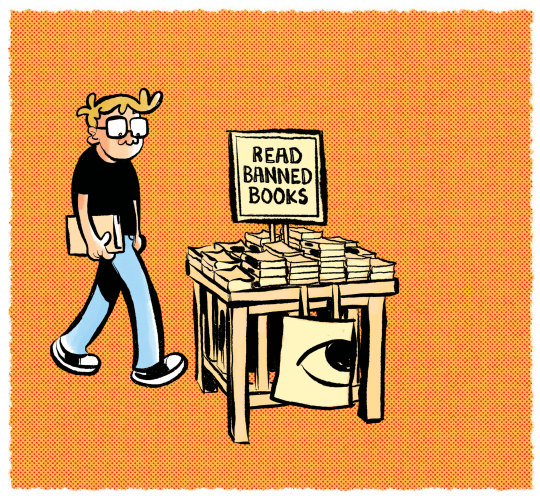
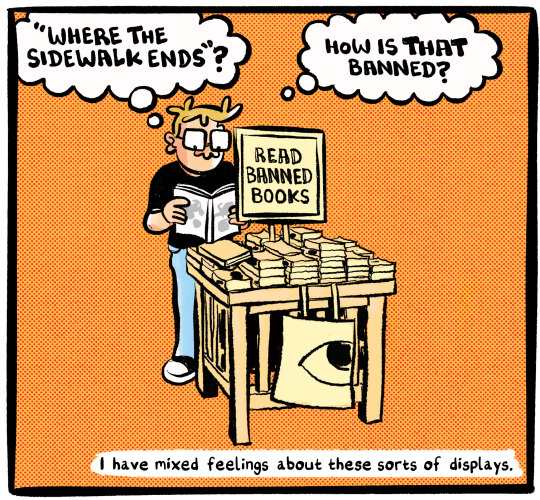
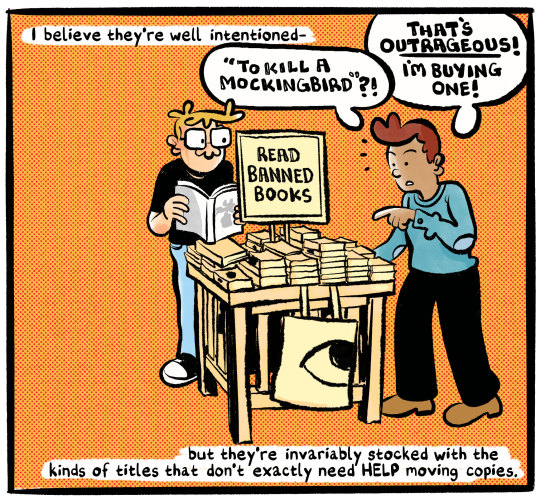
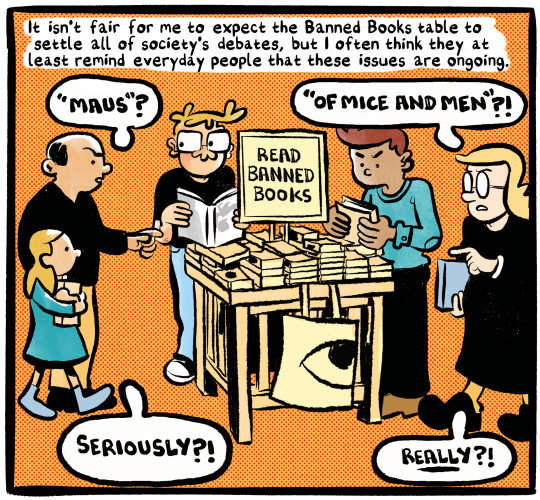
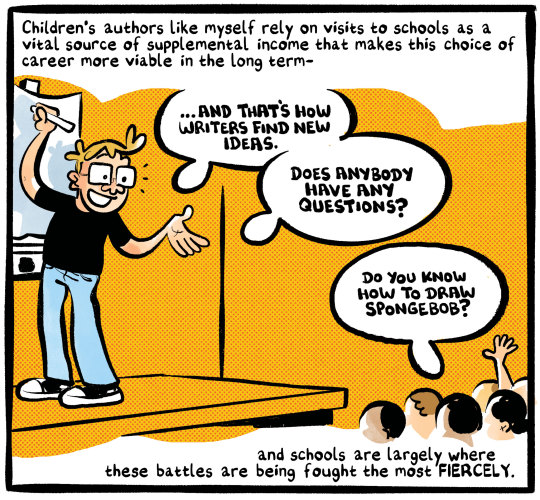
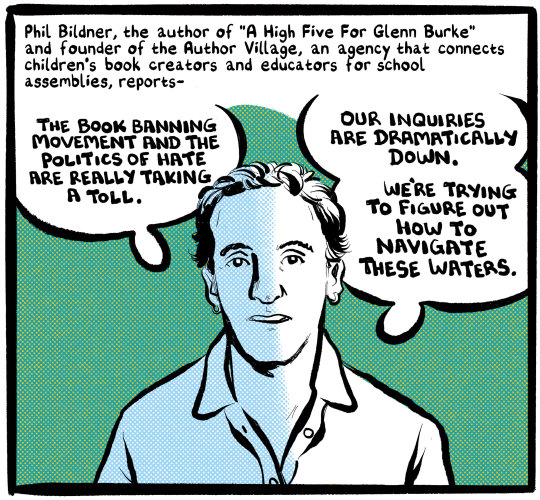
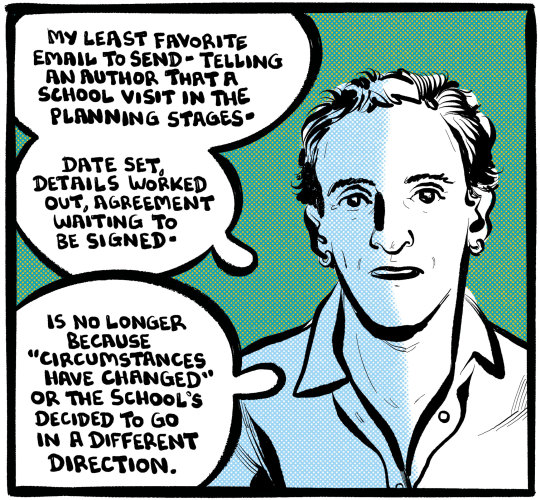
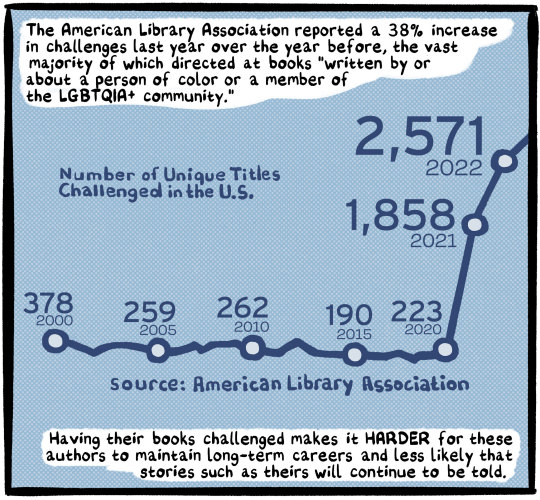
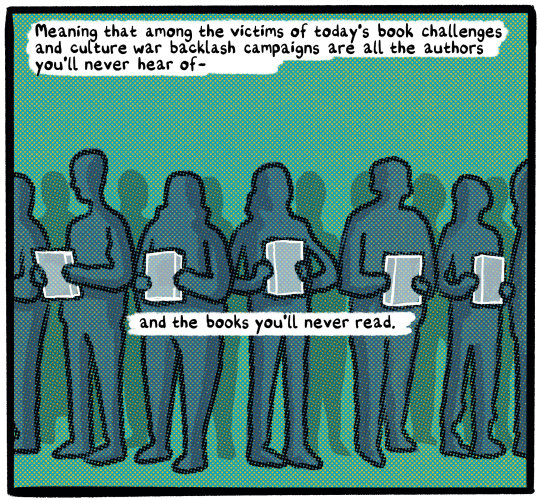
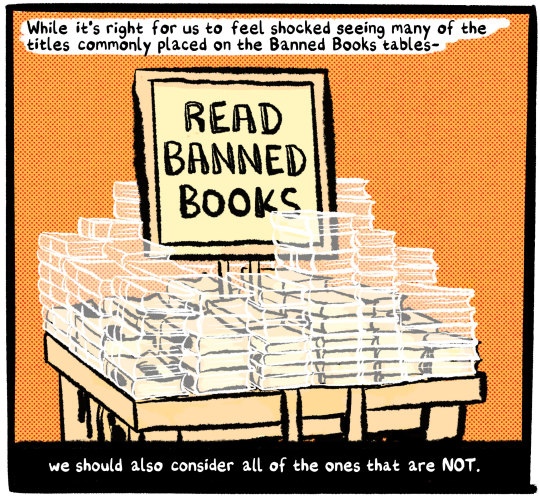
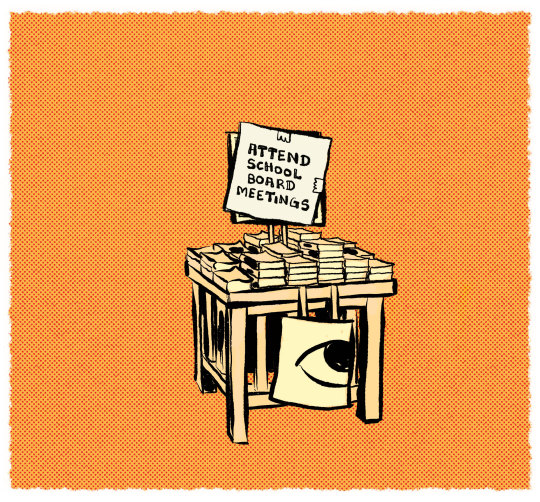
"Read Banned Books" a new full page cartoon essay published in The New York Times Arts & Leisure section today.

75K notes
·
View notes
Text
If nothing, rain shadows and flow of water from high to low elevation should be the bare minimum. So many other features can be extrapolated from here.
reminder to worldbuilders: don't get caught up in things that aren't important to the story you're writing, like plot and characters! instead, try to focus on what readers actually care about: detailed plate tectonics
117K notes
·
View notes
Text
Do the bare minimum.
It's hard to go from nothing to something. But it's easy to go from nothing to barely something.
It's a good start.
do you ever not write for so long that you’re almost afraid to? like what if I’m dumb now
68K notes
·
View notes
Text
Real life seldom make good story, actually.
UNPOPULAR WRITEBLR OPINIONS go go go
I'll start: editing the first draft is fine, actually
427 notes
·
View notes
Text
Tiny Review: Parachute 2023. Modern tale of a neurotic girl.
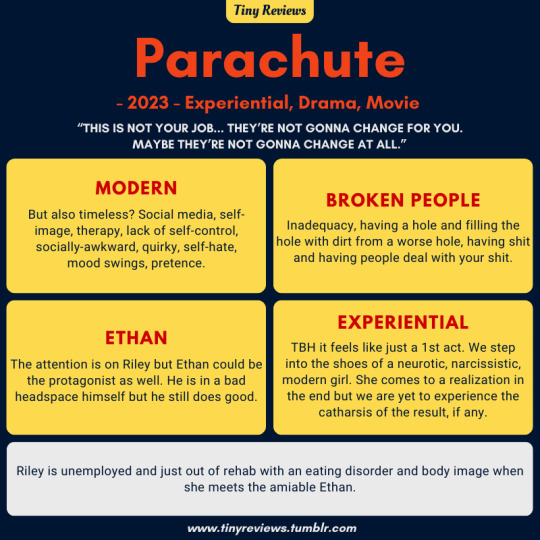
It’s an apt, relatable, timely portrayal of modern mental health problems. But it’s all premise and no catharsis.
It also got me thinking how modern life is ill-suited for humans. Unless we are really disciplined and aware and fortunate, it’s too easy to fall into modern traps. Dopamine, comparison with the top tier, instant gratification. Unhealthy thoughts, words, habits, relationships and lifestyles.
I wonder what the title Parachute refers to? A slow, seemingly dangerous but actually harmless, descent?

Parachute is a 2023 American drama film directed by Brittany Snow in her directorial debut. It stars Courtney Eaton and Thomas Mann.
#parachute#parachute movie#parachute 2023#courtney eaton#thomas mann#experiential movie#drama movies#brittany snow#movie review#2023 movies
3 notes
·
View notes
Text
Tiny Review: Sleeping Dogs 2024. A Russell Crowe Movie.
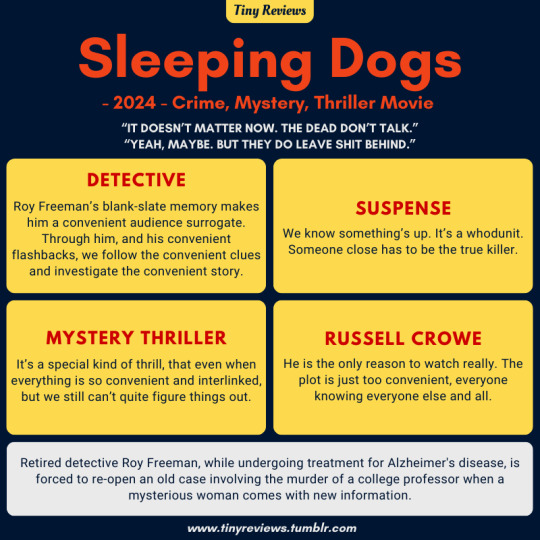
It’s kinda like a sci-fi story. The plot hinges on the convenient missing memories and then remembering crucial details again at convenient times.

Sleeping Dogs is a 2024 American crime mystery thriller film directed by Adam Cooper in his feature-length directorial debut from a screenplay adapted by Cooper and Bill Collage from the 2017 novel The Book of Mirrors by E.O. Chirovici, and starring Russell Crowe and Karen Gillan.
#sleeping dogs#sleeping dogs movie#russell crowe#karen gillan#adam cooper#crime movie#mystery movies#thriller movies#detective movie#movie review#2024 movies
1 note
·
View note
Text
Tiny Review: LaRoy, Texas 2024. Fargo remake.

This reminds so much of a souped-up Fargo. Sad, bumbling characters get caught up in darkly serious situations, in a small town American suburbia. And we can’t quite tell how it will all end.
Hits my sweet spots. Highly recommended.
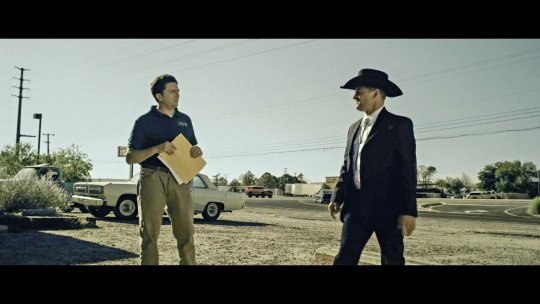
LaRoy, Texas is a 2023 American crime thriller comedy film written and directed by Shane Atkinson. It stars John Magaro, Steve Zahn, Megan Stevenson, Matthew Del Negro and Dylan Baker.
#laroy texas#fargo#john magaro#steve zahn#megan stevenson#matthew del negro#dylan baker#crime movie#thriller movies#dark comedy movie#movie review#2023 movies#must watch
1 note
·
View note
Text
Chapter transitions
Ways to Skip Time In Your Stories
Finding ways to skip time in stories can feel challenging. Writers often worry it’ll make their work feel too amateur or negatively affect their pacing.
The truth is that every author includes ways they skip time to maintain their pacing and plot. Check out a few ways to do it with confidence.
1. Start a New Chapter
Yes, it’s really that simple. Go back to your favorite books and note how each chapter ends. You’ll likely find a few of these tricks that transition the story in ways that match the story’s flow.
Ideas to End a Chapter
The protagonist goes to sleep (likely overused, but practical)
The characters end a conversation
One character informs another of a plot twist
Unexpected action occurs, like a car crash
2. Emphasize the Season
You don’t need to tell the reader exact dates or hours to pass the time. You could mention the season instead.
If a scene or chapter ends in the summer and you need your plot to start in winter, make your protagonist mention something about the leaves changing color and giving way to snow before your action picks up again. It will only take a sentence or two, so it’s also an effective method for short stories.
3. Visualize a Movie Montage
Imagine watching a movie about a character who goes on a summer adventure. They backpack through Europe, but they have to take a flight to get there.
You likely wouldn’t see them standing in airport security lines, napping in a terminal or watching a full movie on their flight to their destination. Instead, you’d get a montage of them driving to the airport with a shot of their plane cruising over the open ocean.
Writers can do the same thing, minus the soundtrack in the background. Describe how your character got to their destination when a new chapter or scene starts. Your readers will get the general idea and appreciate getting straight to the plot that made them pick up your story in the first place.
Here are a few ideas to do this in just a few sentences:
One delayed flight and a bad airplane dinner later, I was walking out of the Amsterdam-Schiphol Airport with an aching back and excited heart.
My trip began with the perfect flight. I got an entire row of seats to myself, which made napping through the trip much easier. A flight attendant roused me awake when it was time to land. I couldn’t believe how fast I’d arrived in Athens that quickly.
My flight was just long enough to catch up on the movies I’d been missing over the last year. The landing gear bounced along the runway in Rome just as the Barbie credits started flashing across my iPad.
4. Showcase Some Confusion
Sometimes we aren’t aware of what time it is. We only know time has passed. That might be the best way to make time pass in your story if your protagonist gets confused, caught by surprise, or otherwise discombobulated.
These are some examples:
I woke up with a bad taste in my mouth. The sun was already peaking in the clear blue sky. How long had it been since my explosive video call with my ex the night before?
The time machine landed with a thud that knocked me to the ground. The control panel exploded in shimmering sparks. What year was it?
Working a double shift always left my brain spinning. I left work, walking across the parking lot with only the stars watching my back. I could feel the hours aching in my feet, but didn’t care what time it really was. I just needed to sleep.
5. Employ a Phrase
There are many quick phrases you can use to make your time jumps immediately clear. Consider using a few of these when you feel creatively stuck:
Later that morning
A few weeks later
After months of trying
Six hours later
The following week
As the store closed for the night
-----
There are many other ways to make time pass in a story. Starting with these could help you figure out the best way to move your story forward without disrupting its pacing.
Remember, you’re in control of your story at all times. There’s always a way through creative challenges if you take a deep breath and try something new.
1K notes
·
View notes